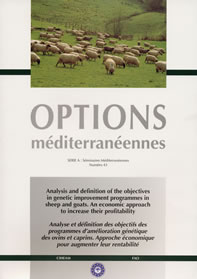| Article précédent | p. 121-127 | Article suivant |
Genetic improvement objectives of sheep and goats in Tunisia. Lessons learned
Tunisia has invested for more than four decades in sheep and goat breeding programmes. Many lessons can be learned today from this experience. Besides having 65,000 ewes currently recorded for the four native sheep breeds (3 meat breeds and one dairy), their productivity remained low even in well managed flocks. This paper shows that these limitations are mainly due to: costs of recording and selection of animals which the government can no longer support by itself; a lack of linkages between the state agency conducting the breeding programme and research/teaching institutions where the know how in animal breeding could be found; and a lack of farmer involvement in the breeding scheme which led to constant changes in breeding objectives of sheep and goat breeds in the country. The absence of a real breeding structure among flocks represents in itself a major constraint for genetic progress dissemination. The need of having a real organization of different stakeholders (farmers, research, marketing, government) is now more than essential in order for the current sheep and goat breeding strategy to be successful and to make better use of the country's animal genetic resources.
- [ Afficher ]
- [ Télécharger ]
- [ Exporter la citation ]
Vous pouvez télécharger la citation au format :
- [ Imprimer ]
-
Mots-clés
AMELIORATION DES ANIMAUX, CAPRIN, CRITERE DE SELECTION, OVINCiter cet article
Djemali M. Genetic improvement objectives of sheep and goats in Tunisia. Lessons learned. In : Gabiña D. (ed.). Analysis and definition of the objectives in genetic improvement programmes in sheep and goats. An economic approach to increase their profitability . Zaragoza : CIHEAM, 2000. p. 121-127. (Options Méditerranéennes : Série A. Séminaires Méditerranéens; n. 43). Meeting of the Sub-Network on Genetic Resources of the FAO-CIHEAM Inter-Regional Cooperative Research and Development Network on Sheep and Goats, 1999/11/18-20, Zaragoza (Spain). http://om.ciheam.org/om/pdf/a43/00600477.pdf



